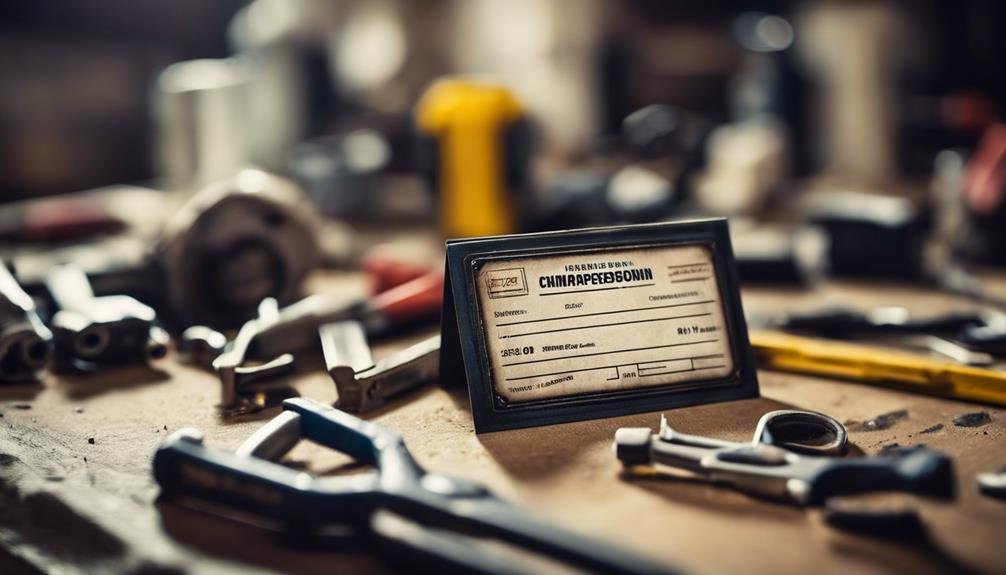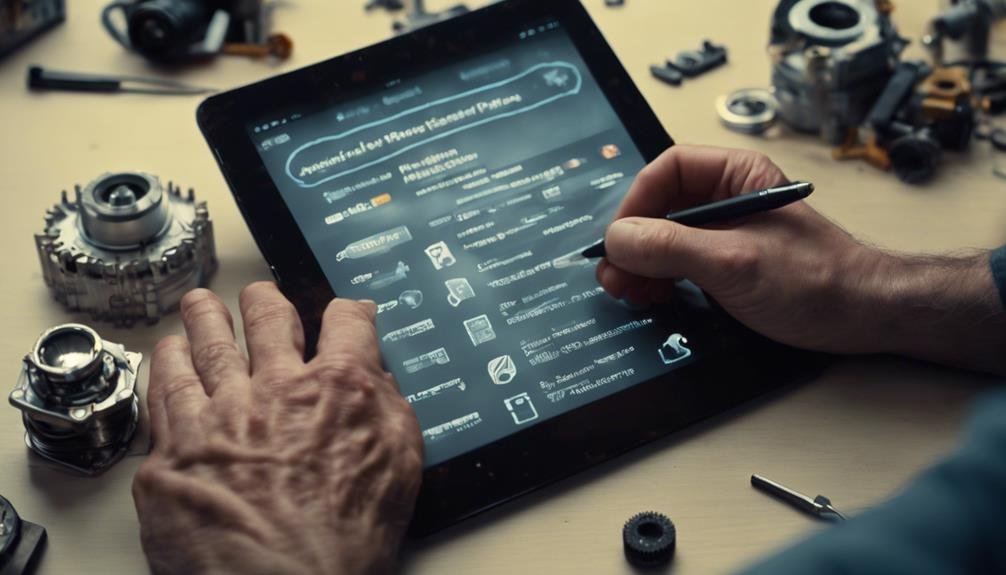When selecting repair services, it's crucial to conduct thorough research. This involves checking customer feedback, accreditations, and referrals to assess reputation. Experience and professionalism play key roles in determining the service provider's ability to handle challenges effectively.
It's essential to verify licenses, certifications, and background checks to ensure expertise. While considering pricing, remember that the cheapest option may not always deliver the best results. Getting quotes from multiple reputable providers helps avoid unexpected costs.
Reading recent reviews sheds light on service quality and reliability, and receiving referrals from trusted sources adds to your confidence. Transparent communication regarding issues, costs, and repairs is vital for a smooth process. By taking these steps, you can choose a truly professional repair service that meets your needs.
Research Reputation
When evaluating potential repair professionals, it's crucial to thoroughly investigate their reputation. This can be done by reviewing online feedback, checking for industry accreditations, and seeking referrals from reliable sources.
Online reviews offer valuable insights from previous customers regarding the quality of work, customer service, and overall experience. While reviews are helpful, it's important not to rely solely on them as they may be biased or inaccurate.
Verifying if a repair service holds accreditations from relevant industry organizations is essential as it signifies meeting specific standards and qualifications. Additionally, seeking referrals from friends, family, or trusted individuals who've had positive experiences with the repair service can provide firsthand recommendations.
Considering the longevity of a repair service in the industry is also important. Established companies with a proven track record are generally a safer choice compared to new, untested options.
Assess Experience
When assessing the experience of a repair service, it's important to consider how long they've been in business and any relevant certifications or licenses they hold. These factors give us a good idea of their expertise and dedication to delivering high-quality work.
Years in Operation
When evaluating a repair service, considering the number of years it has been in operation is crucial. Longevity in the industry indicates experience and adaptability to changes over time. Established companies have likely navigated through various economic conditions, technological advancements, and shifting customer demands, showcasing their resilience and dedication to their work.
While longevity doesn't automatically guarantee high quality, it does suggest a track record of customer satisfaction. Such companies have had ample opportunities to refine their processes, invest in training, and build a strong reputation. On the other hand, newer businesses may also excel, especially if they're led by experienced professionals who've recently ventured out on their own.
It's essential to delve deeper into a repair service's background, including reviews, credentials, and warranties, in addition to considering their years in operation. This information offers valuable insights into a company's stability and expertise within the industry.
Experience plays a significant role, especially in handling complex repair tasks effectively.
Certification and Licensing
When choosing a repair service, it's crucial to prioritize providers with legitimate certifications and licenses. These credentials indicate professionalism, adherence to industry standards, and the necessary skills for safe and effective repairs. Reputable organizations offer relevant certifications that guarantee a provider's expertise in the field.
Moreover, businesses offering repair services often need specific licenses or permits based on local regulations. Ensuring that a provider holds all required licenses is essential for legal protection and compliance. Licensed professionals undergo inspections and follow codes of conduct to maintain their credentials.
While certifications and licenses don't guarantee flawless service, they demonstrate a commitment to quality and expertise. It's wise to choose providers who've taken the steps to obtain proper credentials, as it shows their dedication to running a trustworthy business.
However, considering factors like experience, reputation, and customer feedback is also important for making an informed decision.
Verify Credentials

To ensure we receive top-notch service, it's crucial to verify the credentials of potential repair professionals. This process entails confirming that they hold valid licenses and certifications in their field.
Additionally, we should validate their experience by checking references from reputable sources. It's also important to inquire about their background check procedures to assess their trustworthiness and professionalism.
This thorough vetting process helps guarantee the quality and reliability of the service we'll be receiving.
License and Certification
Before hiring a repair service, it's crucial to verify their credentials by checking for the appropriate licenses and certifications. This step ensures that the professionals we choose to work with are qualified, insured, and compliant with industry standards. Licenses indicate expertise and dedication to their craft, while certifications validate specific skills and training.
Some common licenses and certifications to look for include a Contractor's License, necessary for most construction and repair tasks, especially for general contractors, plumbers, and electricians.
EPA Certification is mandatory for handling refrigerants and hazardous materials, essential for HVAC technicians and appliance repair specialists.
Manufacturer Certifications provide specialized training from product manufacturers, particularly valuable for appliance repair and electronics repair professionals.
Additionally, Industry Certifications offer voluntary credentials showcasing advanced skills, commonly seen in automotive repair and IT services.
Industry Experience Verification
When selecting a repair service, it's essential to verify their industry experience in addition to their licenses and certifications. Companies with a long history in the field are likely to have a strong reputation, extensive knowledge, and proven expertise. To assess their credibility, you can check their website, online reviews, and involvement in industry associations.
It's also important to inquire about the training and experience of the technicians who'll be working on your repairs. Established companies typically employ highly skilled professionals who've undergone thorough training and gained significant hands-on experience. Experienced technicians are better equipped to diagnose and resolve complex issues efficiently.
To confirm a company's credentials, ask for references or testimonials from past customers, inquire about any awards or recognition they've received, and ensure they use industry-standard tools and techniques. By thoroughly evaluating a repair service's experience and credentials, you can increase the chances of receiving high-quality work and a satisfactory outcome.
Background Check Process
When selecting a repair service, it's crucial to conduct a thorough background check to ensure their credibility. This process involves verifying their licenses, certifications, and any history of complaints or disciplinary actions. By doing so, we can confirm their qualifications and ethical standards.
We will check if they've the necessary licenses to operate in our area and ensure that these licenses are current. Additionally, we'll confirm if they hold any required certifications for the specific services they offer. Reading customer reviews and ratings from reliable sources can provide valuable insights into their reputation and work quality.
It's also important to look into any unresolved complaints or disciplinary actions against the company or their technicians. Public records from regulatory bodies and consumer protection agencies can shed light on any concerning patterns. While minor issues are common, recurring serious violations should be taken as a warning sign.
Consider Pricing
When choosing professional repair services, pricing is a crucial factor to consider. It's essential to find a balance between quality and cost, as opting for the cheapest option may result in subpar work or unexpected expenses later on. Conversely, the most expensive service doesn't always guarantee the best results.
For different types of repairs, the price ranges can vary. For appliance repair, prices typically range from $50 to $150 for the low end, $150 to $300 for the average, and $300 to $500 or more for the high end. Plumbing repair costs can range from $100 to $200 for the low end, $200 to $400 for the average, and $400 to $800 or more for the high end. Electrical repairs may cost between $75 to $200 for the low end, $200 to $500 for the average, and $500 to $1000 or more for the high end. HVAC repair services usually fall within the range of $100 to $300 for the low end, $300 to $600 for the average, and $600 to $1200 or more for the high end. Car repairs can vary from $50 to $200 for the low end, $200 to $500 for the average, and $500 to $1500 or more for the high end.
It is advisable to obtain quotes from reputable providers to compare both pricing and services offered. This way, you can make an informed decision that aligns with your budget while ensuring quality workmanship.
Read Reviews

When considering professional repair services, it's crucial to read reviews to assess the quality of service. Reviewing feedback from various sources can offer valuable insights into a company's reliability, workmanship, and customer service.
Positive reviews that emphasize punctuality, attention to detail, and reasonable pricing are indicators of a dependable provider. Conversely, recurring negative comments about missed deadlines, poor work quality, or excessive charges should raise red flags.
Reviews can also shed light on a company's expertise, specializations, and common repair types, helping us determine if they align with our specific needs. It's important to consider the timeliness of reviews, as a service provider's performance can change over time.
While perfection is rare, consistently positive reviews from diverse sources can instill confidence in the quality and professionalism of a repair service. Thoroughly researching reviews enables us to make informed decisions and increases the chances of a successful repair experience.
Seek Referrals
Apart from checking online reviews, one effective way to find a reliable repair service is by asking for recommendations from people we trust. Seeking referrals from friends, family, or colleagues who've had positive experiences with a repair service can provide valuable insights into their quality of work, customer service, and overall satisfaction.
When seeking referrals, it's important to ask about specific aspects that matter to us, such as clear pricing, efficient turnaround times, and the expertise of the technicians. We can also explore local community groups, neighborhood associations, or online forums to gather a wider range of recommendations.
To ensure we make an informed decision, it's advisable to collect multiple referrals and compare them with online reviews. By combining personal recommendations with research, we increase our chances of finding a trustworthy repair service that can meet our needs effectively and professionally.
Evaluate Communication

Good communication is essential for ensuring a high-quality repair service. When assessing a potential repair service, it's important to consider how effectively they communicate with customers. Are they able to clearly explain the issue, the necessary repairs, and the costs involved? Transparent communication is key to establishing trust and setting realistic expectations.
Another aspect to evaluate is their responsiveness. How quickly do they reply to inquiries or provide updates? A prompt response demonstrates good customer service. It's also beneficial if they use our preferred method of communication, whether it be phone calls, emails, or messaging apps.
Furthermore, it's important to assess their listening skills. Do they take the time to understand our concerns and ask relevant questions for clarification? Active listening ensures that they fully comprehend the problem before proceeding with the repairs. Effective two-way communication helps prevent any potential misunderstandings.
Conclusion
Choosing the right professional repair service is crucial to avoid additional problems, as revealed by a study showing that 38% of customers faced issues post low-quality repairs.
When considering repair options, it's vital to assess factors like reputation, experience, credentials, pricing, reviews, referrals, and communication. Taking the time to thoroughly vet potential providers can help you make an informed decision and increase the chances of a successful repair.

